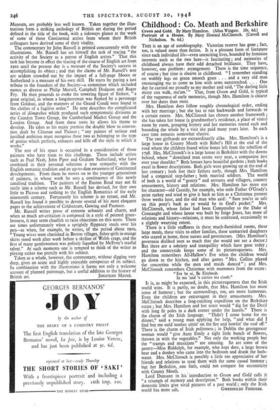Childhood : Co. Meath and Berkshire
THIs is an age of autobiography. Victorian reserve has gone ; fact, too, is valued more than fiction. It is a pleasant form of literature since each individual life—even unexciting lives, bounded by feminine interests such as the two here—is fascinating ; and memories of childhood always have their odd detached brilliance. They have, however, one problem: arrangement. There is the time sequence, of course ; but time is elusive in childhood. "I remember standing on wobbly legs on green smooth grass . . . and a very old man encouraging me to come to him with arms outstretched. . . One day he carried me proudly to my mother and said, 'The darling little missy can walk, ma'am." That, from Green and Gold, is typical of the vagueness of early memories, though Mrs. Hamilton is clearer over her dates than most.
Mrs. Hamilton does follow roughly chronological order, ending with her marriage • but she has to run backwards and forwards to a certain extent. Mrs. McClintock has chosen another framework ; she has taken her house (a grandmother's residence, a place of visits) room by room, grouping history and her memories round each and bounding the whole by a visit she paid many years later. In each case time remains somewhat elusive.
The two girlhoods are extraordinarily alike. Mrs. Hamilton's is a large house in County Meath with Rebel's Hill at the end of the road where the children found white bones left from the rebellion of 1798. Mrs. McClintock's is a large house in Berkshire with the downs behind, where " downland man seems very near, a companion just over your shoulder." Both houses have beautiful gardens ; both books excel in flower descriptions. Both girls were growing up at the end of last century both lost their fathers early, though Mrs. Hamilton had a congenial step-father ; both married soldiers. The world of both is a world of " gentry " and servants and villagers, country amusements history and relations. Mrs. Hamilton has more eye for character—old Cassidy, for example, who stole Father O'Grady's prize turkey and tried to give it back to him as a Christmas present three weeks later, and the old man who said: "Sure you're as safe on this pony's back as ye would be in God's pocket." Mrs. McClintock, whose father had been Comptroller to the Duke of Connaught and whose house was built by lingo Jones, has more of relations and history—relations, it must be confessed, occasionally to a slightly wearying extent.
There is a little stuffiness in these much-furnished rooms, these large meals, these visits to other families, these unmarried daughters who stayed at home, these nurses and governesses. (Mrs. Hamilton's governess disliked men so much that she would not see a doctor.) But there are a sobriety and tranquillity which have gone today ; and the countryside keeps some of its picturesqueness. Mrs. Hamilton remembers All-Hallow's Eve when the children would go down to the kitchen, and after games "Mrs. Collins played the concertina while the men and maids danced " ; and Mrs. McClintock remembers Christmas with mummers from the estate: "Ere be oi, Be Elzeboob.
In ma 'and 'a carries ma cloob."
It is, as might be expected, in this picturesqueness that the Irish world wins. It is partly, no doubt, that Mrs. Hamilton has more sense of humour ; but the surroundings, too, are more humorous. Even the children are extravagant in their amusements. Mrs. McClintock describes a frog-catching expedition on the Berkshire estate ; but Mrs. Hamilton and her sister would "dig for the Devil with long fir poles in a dark corner under the laurels." There is the charm of the Irish language. "Didn't I come home for me dinner," said a young man applying for help, "and what did I find but me ould mother sittin' on the fire and howlin' the roof off." There is the charm of Irish politeness ; in Dublin the greengrocer woman would "give Aunt Emily a tight little bunch of flowers, thrown in with the vegetables." Not only the working people but the "tramps and musicians" are amusing. So are some of the gentry—Miss Biddulph, for example, who kept deer, a large brown bear and a donkey who came into the bedroom and drank the bath- water. Mrs. McClintock is possibly a little too appreciative of her friends and relations to treat them with the same casual humour ; but her Berkshire , one feels, could not compare for eccentricity with County Mead,. Lord Dunsany in his introduction to Green and Gold calls it "a triumph of memory and description." Both books within their domestic limits give vivid pictures of a past world ; only the Irish


































 Previous page
Previous page